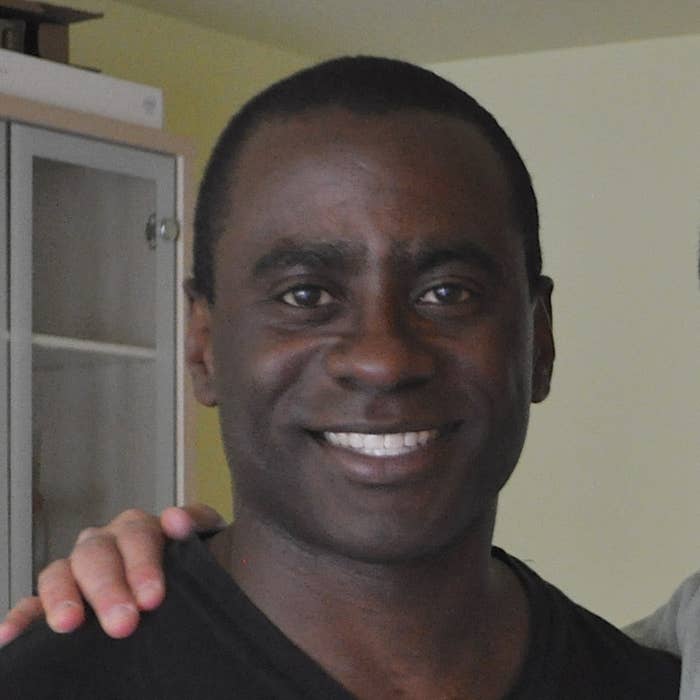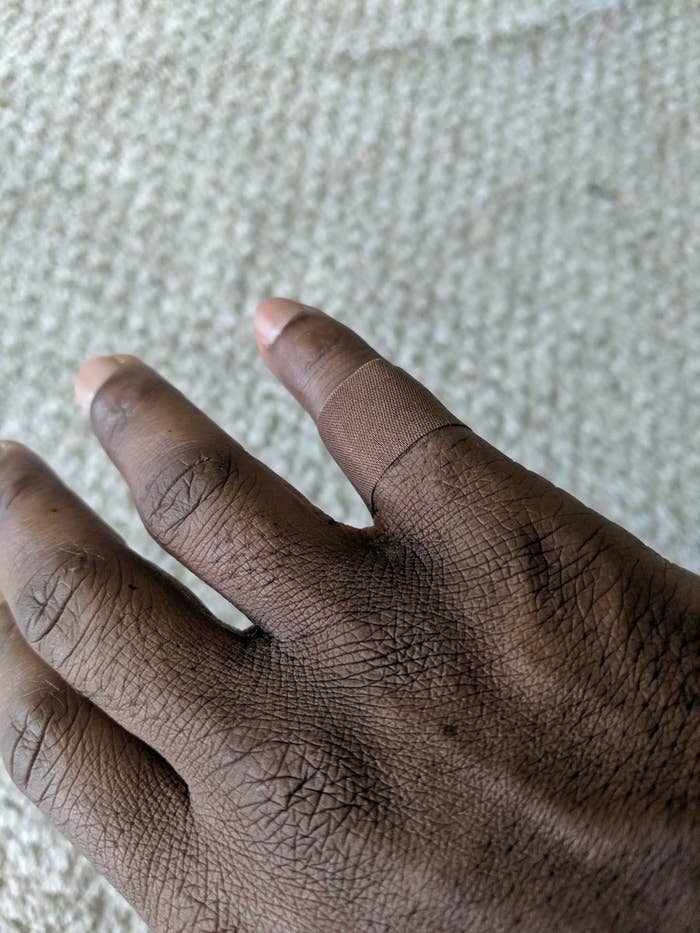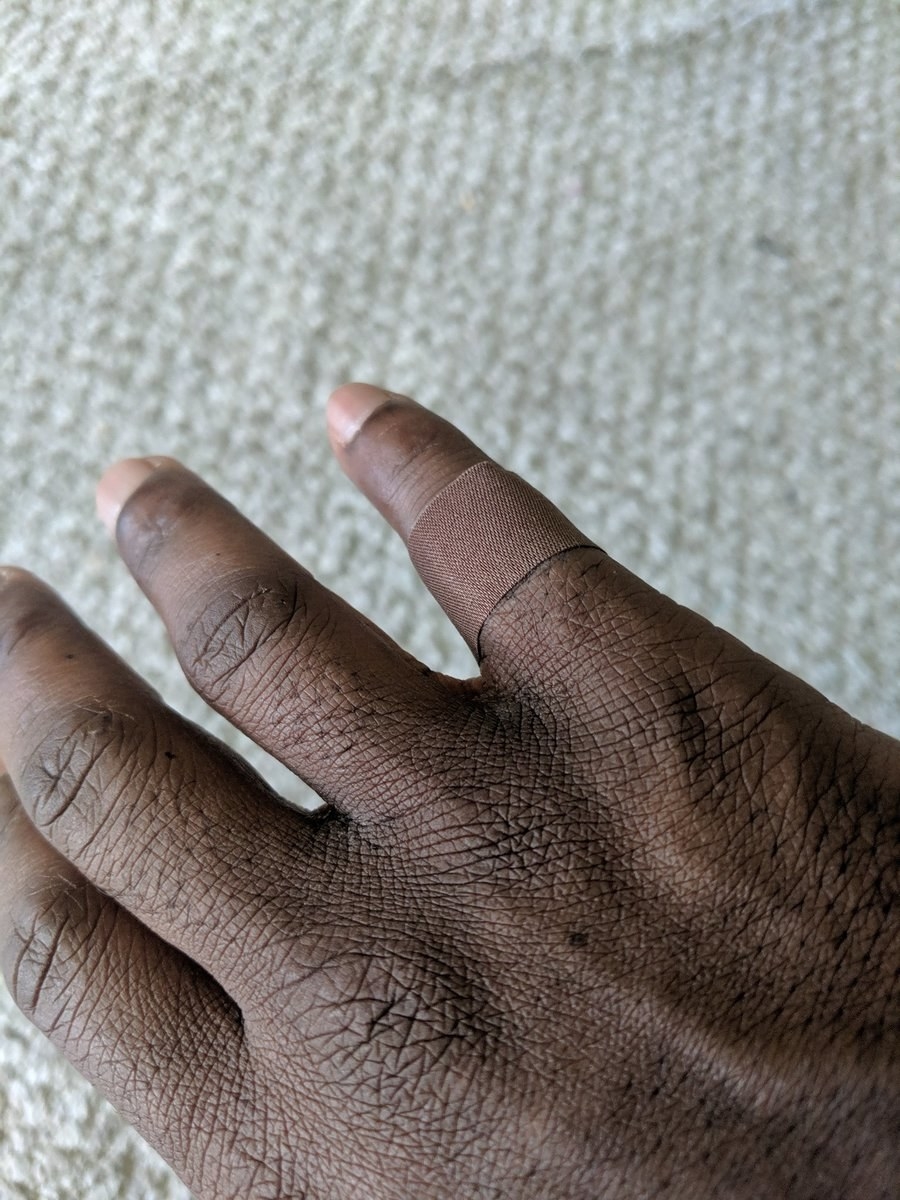
A 45-year-old man's sincere and emotional response to something as typically unremarkable as putting on a bandage has gone viral — and made others aware of how simple products can have a profound effect on issues as complex as race.
Dominique Apollon told BuzzFeed News he's "taken 45 trips around the sun" before discovering an everyday product that was specifically designed "with someone who looks like [him] in mind."
Apollon, the vice president of research at Race Forward, a nonprofit that builds awareness for racial justice, was looking to spend the rest of his Flexible Spending Account funds when he came across these bandages that came in a number of darker skin tones.
"As a black person, I'm not used to seeing products geared to me in national online retailers," he said. "The default is typically some type of Caucasian skin tone."
Apollon said he also wasn't "overly eager" to try on this particular bandage in a specialty shade. He said the box sat in his home for about five months until he got a cut on his right pinkie finger Friday and needed to put one on.

The effect of putting it on for the first time, however, caught even him by surprise.
"I could hardly see it," he said of the bandage on his skin. "It just blended so perfectly in a way that if I was walking into a room, no one would even notice it was there."
Apollon joked that he's not "like some person who sits around just admiring his skin or features" all day, but he was "struck" by how emotional of an experience it was.
"I just started feeling sad that I'd spent my entire life — 45 years — perhaps without ever having experienced that before. It's impossible to say, but how might I have felt if I'd had that experience of care as a kid," he said. "It's a product that said to me, 'We see you. you're valued.'"

Of course, he noted, that he knew the typical beige coloring of bandages could also be for a medical reason: visibility. "But it's nice to have a choice, and know that a company didn't just default to the white experience," he said. "It just signals that you're a valued member of society."
He shared the moment on Twitter, writing he was "holding back tears" for an experience as mundane as putting on a bandage for a cut. His post has been retweeted over 94,000 times.
Some responded to his tweet, sharing that applying bandages were some of their first memories of being "made aware of 'race'" when they were children. Other black and brown people said that the household products, like Band-Aids or crayons, were frequently called "flesh" colors, which often confused kids who had darker complexions.
"I remember being upset that nothing really worked," one user wrote.
@AuRevoir3179 @ApollonTweets Oh, man. The "flesh" crayon confused me so much when I was a kid, & my mom tried her best to help me find the crayon that matched me the best, but I remember being upset that nothing really worked.
Those who couldn't personally relate said they were suddenly made aware of something they'd "never once given a thought about," as one user wrote.
"I can’t begin to tell you how amazing that is. Yet so simple and going why in the hell did it take this long to do something so simple that means so much to people?" another said.
@ApollonTweets @karenaboylan Your point is so profound. I am guilty as I had never once given that a thought, for being such a small thing. However, it is rather significant and I thank you for the enlightenment. I am happy for you. Thanks for sharing, I learned something today.
A few self-identified teachers said they were inspired to stock some in their classrooms.
"Thank you for this. I work in a school and because of your tweet I just purchased a pack of TruColor bandages to have on hand. It’s a small thing that might make a big difference to a child," one wrote.
@ApollonTweets @JohnBoyega Future teacher here! Adding these to my list of essential classroom supplies! ❤️
For some who didn't quite empathize or understand, saying the color of the bandage "doesn't matter," Apollon responded that the previous lack of availability felt like "exclusion through a thousand cuts."
"It's a cumulative and compounding experience over time. And it fits a broader pattern of exclusion that is even more painful and damaging," he said, pointing to other "flesh"-colored products like crayons, bras, panties, and ballet shoes that Twitter users have already called attention to.
"I'm not saying that the industry should be designing bandages with shades that match every skin tone in the human spectrum," he added. "The point is in a just society, everyone should feel so valued, so embraced, and seen."
This not a little thing. https://t.co/GFVFFGpJhT
